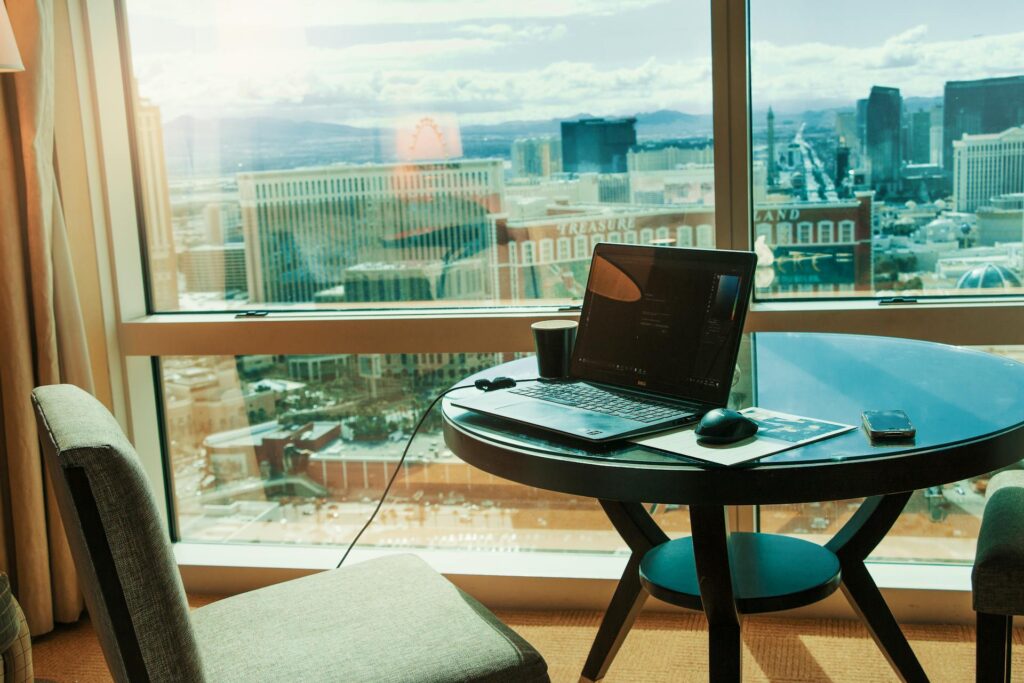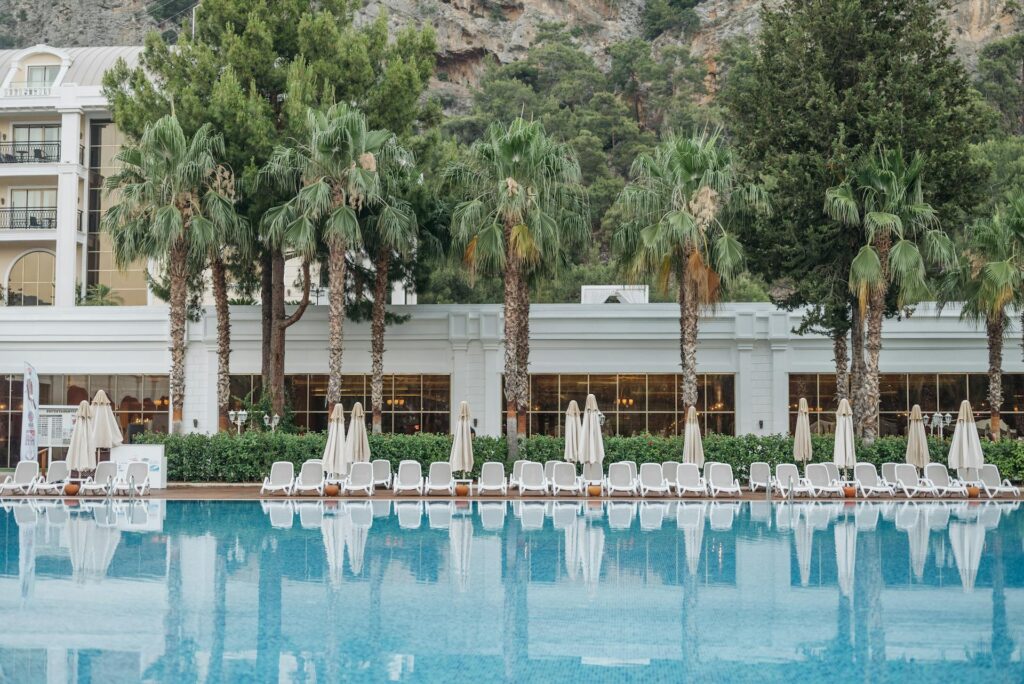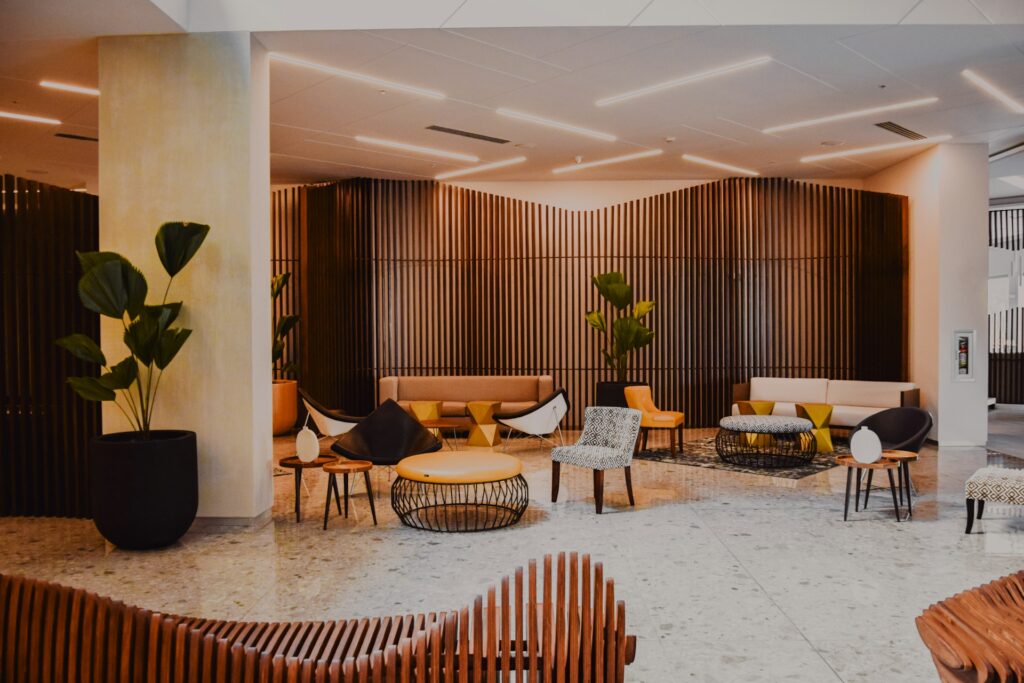Hotels Built for Work: The Tech and Comfort Remote Workers Need

Hotels built for remote work stand to gain a competitive advantage in today’s post-pandemic hospitality market. According to SiteMinder’s Changing Traveller Report 2025, 41% of global travelers plan to work during their hotel stays in 2025, highlighting a significant demand for accommodations that facilitate remote work.
With this shift, hotels are evolving to cater to the needs of remote professionals, offering not only comfort but also essential tech to keep them connected, productive, and comfortable. In this article, we explore how the ever-evolving demands of remote workers are reshaping hotel trends and the rise of work-friendly (smart) accommodations.
The Shift to Work-Ready Hotels
According to ThinkRemote, a recent survey revealed that 65% of Americans reserve hotel rooms for work purposes between one to four times per month. This trend, often referred to as “work-from-hotel,” highlights the growing preference for hotel environments among remote professionals.
Beyond the growing trend of hotel bookings for work, what’s significant is how hotels are increasingly favored over traditional spaces– including co-working spaces or cafes. A UK study by Guestline revealed that hotels outperformed coffee shops in the top three factors remote workers prioritise: internet speed (43%), quietness (38%), and comfort (35%).
This underscores the potential of smart hotels to deliver an unmatched productivity-focused experience.
Tech and Comfort Remote Workers Expect
Remote workers rely on certain essentials for productivity while traveling.
Arguably, WiFi speed and connectivity is the top factor when choosing a hotel. A 2023 survey by Hotel Management found that 51.6% of hoteliers reported slow, unreliable Wi-Fi as the top technology complaint from guests. With the global rise of bleisure travel, upgrading Wi-Fi infrastructure is no longer optional—it’s a fundamental requirement to meet the expectations of modern travelers who combine work and leisure.
For comfort, ergonomic workspaces matter. While dining tables could work for less discerning remote workers on short stays, the absence of a well-designed desk and chair in a hotel room can be a major drawback for most.
Additionally, remote workers also look for these features in hotels:
- Workspace Variety: From meeting rooms and business centers to communal areas, remote workers like various hotel workspaces that can be utilised for private calls or coworking.
- On-site Amenities: For better work-life balance, hotels with wellness-oriented amenities like gyms, pools, and restaurants/bars can particularly appeal to remote professionals.
- Smart Hotels and Room Automation: Remote workers appreciate customizable room settings for maximum productivity and comfort. Around 75% of hotel guests prefer controlling temperature and lighting through in-room tech, such as smartphone apps or voice-activated systems. 71% of guests prefer hotels that offer smart room technology.
- Quiet Zones: Noise reduction is crucial for maintaining focus. Hotels adapt by adding soundproofing to their rooms and creating dedicated work lounges or coworking spaces.
By catering to these preferences, hotels are positioning themselves as ideal destinations for remote workers who demand both functionality and comfort during their stays.
Beyond the Essentials: Tailored Services, Packages, and Programs That Go the Extra Mile

While basic tech and comfort are essential, smart hotels are going beyond the bare minimum to meet diverse needs. Here are some notable offerings that promote productivity while creating unique experiences for remote workers.
Homelike Environments
Many smart hotels are creating homelike environments for long-term remote stays. These rooms are designed with comfort and functionality in mind. In addition to smart room temperature/lighting controls via smartphone apps and voice-activated systems, these rooms typically offer cozy furniture, kitchenettes, and laundry services, making it easier for remote workers to feel at home while traveling.
It is common for extended-stay hotels, like the Residence Inn by Marriott, to offer fully equipped kitchens and living spaces— allowing guests to cook and relax like they would at home.
Remote Dining Options
Dining can be a challenge for remote workers, especially when juggling meetings and tight schedules. Many hotels now offer remote dining solutions, including room service, grab-and- go options, or dedicated workspaces with food sold on-site. High-end hotels like the Four Seasons offer extensive 24-hour in-room dining options, with meals designed to keep remote workers energised and healthy.
These services are increasingly supported by digital concierge apps, allowing guests to order meals or make special requests with just a few taps. A study by travel technology firm Criton highlights that nearly 80% of hotel guests value mobile apps for enhancing convenience, including ordering food or other services.
Such seamless integration of tech and hospitality ensures that remote workers can stay nourished and productive without missing a beat.
Remote Programs and Day Passes
Many hotels now offer flexible remote work packages and day passes for remote workers who need a workspace for only a few hours to a day. These options provide access to private offices, coworking spaces, and meeting rooms without the need to book hotel stays.
Hotels like the Hilton and Marriott offer work-from-hotel packages, providing travelers access to coworking spaces and business centers within the hotel.
Long-Term Stay Packages and Loyalty Programs
For those working remotely for extended periods, hotels are offering long-term stay packages that may include discounts, special services, and additional perks.
Hotels like Marriott’s Extended Stay Solutions are leading the way in catering to this growing market. With over 1,000 locations, these properties are designed to provide all the comforts of home alongside the tools for productivity. These spacious accommodations feature suites with full kitchens, separate workspaces, and shared social areas. They come complete with on-site amenities like fitness centers, laundry facilities, and grocery delivery services.
Many hotels including Marriott’s Extended Stay hotels offer discounted pricing for longer stays. Guests can earn rewards through programs like Marriott Bonvoy, redeemable for free nights, flights, or other benefits, adding value for frequent travelers.
Why Businesses Are Choosing Smart Hotels

Beyond attracting individual business travelers, smart hotels also attract businesses seeking venues for offsite meetings, corporate events, and retreats. To cater to corporate needs, these hotels offer productivity-enhancing amenities and flexible spaces.
Going beyond productivity and wellness, many smart hotels differentiate themselves by blending sustainability with world-class hospitality, making them irresistible to business travelers and corporations. In Singapore, PARKROYAL COLLECTION Pickering and Fairmont stand out as prime examples, attracting companies with their innovative and eco-conscious approaches.
In general, hotels can attract more corporate bookings by offering:
- Tailored corporate packages with discounts or perks for bulk bookings.
- Customizable meeting and event spaces with advanced tech setups.
- Exclusive access to networking events or remote work hubs within the hotel.
Key Takeaways: Shaping the Future of Remote Work in Hospitality
The shift toward work-friendly hotels is a clear response to the evolving needs of remote professionals and businesses alike. To stay competitive, hotels must embrace this growing trend and offer features that cater to productivity, comfort, and convenience.
- Essential tech and comfort: Fast, reliable WiFi, ergonomic workspaces, and quiet environments are non-negotiables for remote workers.
- Enhancing work-play experiences beyond the basics: Leading hotels offer tailored services like smart room technology, wellness-oriented amenities, and remote dining options.
- Flexible offerings: Programs like day passes, long-term stay packages, and loyalty rewards ensure hotels remain attractive to both short-term and extended-stay guests.
- Corporate appeal: Customizable meeting spaces, sustainable hospitality, and tailored packages attract both individual travelers and businesses hosting offsite teams and events.
Hotels prioritising remote working professionals’ evolving demands will emerge as leaders in the hospitality industry, redefining what it means to “work from anywhere.”


